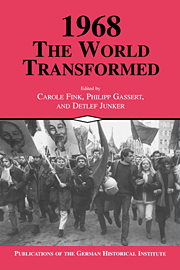Book contents
- Frontmatter
- Introduction
- Part One Tet and Prague: The Bipolar System in Crisis
- Part Two From Chicago to Beijing: Challenges to the Domestic Order
- 7 1968 and the Unraveling of Liberal America
- 8 March 1968 in Poland
- 9 May 1968 in France
- 10 A Laboratory of Postindustrial Society: Reassessing the 1960s in Germany
- 11 The Third World in 1968
- Part Three “Ask the Impossible!”: Protest Movements of 1968
- Epilogue
- Index
9 - May 1968 in France
The Rise and Fall of a New Social Movement
Published online by Cambridge University Press: 05 January 2013
- Frontmatter
- Introduction
- Part One Tet and Prague: The Bipolar System in Crisis
- Part Two From Chicago to Beijing: Challenges to the Domestic Order
- 7 1968 and the Unraveling of Liberal America
- 8 March 1968 in Poland
- 9 May 1968 in France
- 10 A Laboratory of Postindustrial Society: Reassessing the 1960s in Germany
- 11 The Third World in 1968
- Part Three “Ask the Impossible!”: Protest Movements of 1968
- Epilogue
- Index
Summary
In France, the United States, and the Federal Republic of Germany, 1968 witnessed the greatest protest mobilization of the postwar period. The protest movements in each of these countries displayed a specific self-perception and constitution but were similar in values, forms of action, mobilization strategies, and accomplishments. These similarities go beyond national characteristics and illustrate features common to all social movements. Everywhere, the protesters challenged the established institutions of Western democracy. They questioned the exclusive right of representation by established parties and intermediary groups, confronted those parties and groups with an opposing power and public presence that negated traditional structures of institutional authority, and criticized the basic assumptions of the postwar order. However one judges these phenomena historically, the spontaneous mobilization of protest movements within highly organized and affluent democratic societies requires explanation.
How, then, do we explain the events of May 1968 in France, for example, and the powerful effect they had? Different analysts have interpreted the May movement variously as a “new social conflict” (Touraine), a “generational revolt” (Morin), an “institutional crisis” (Crozier), and a “critical moment” in the development of society (Bourdieu). Just as divergent as these sociological constructions are the overall assessments of these events.
- Type
- Chapter
- Information
- 1968: The World Transformed , pp. 253 - 276Publisher: Cambridge University PressPrint publication year: 1998
- 3
- Cited by

